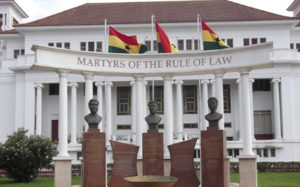Supreme Court dismisses certiorari and prohibition motion against Justice Honyenuga
 The Supreme Court has dismissed an application for certiorari and prohibition by Dr Stephen Opuni, a former Chief Executive of COCOBOD, seeking to stop Justice Clemence Jackson Honyenuga, from continuing to hear his case.
The Supreme Court has dismissed an application for certiorari and prohibition by Dr Stephen Opuni, a former Chief Executive of COCOBOD, seeking to stop Justice Clemence Jackson Honyenuga, from continuing to hear his case.
Professor Emmanuel Nii Ashie Kotey, who presided over the panel, said they had examined the issues and had not seen any form of bias in the trial.
Dr. Opuni’s application alleged an “open hostility” towards him by the trial judge, a Supreme Court Judge, sitting as an additional High Court Judge, claiming, “his acts and conducts are such that justice cannot be said to be seen to be done.”
Mr Samuel Codjoe, the Counsel for Dr Opuni, before moving the application prayed the Apex Court for an order to cross-examine the trial because Justice Honyenuga filed an affidavit in opposition in which he denied any form of what happened at the High Court.
The Counsel, who cited legal documents to support his arguments said the trial judge filed the affidavits in opposition on January 25, 2022.
Dr Opuni and Mr Seidu Agongo, CEO of Agricult Ghana Limited are facing 27 charges, including defrauding by false pretences, willfully causing financial loss to the State, money laundering, corruption by a public officer and contravention of the Public Procurement Act.
They have both pleaded not guilty to the charges and are on a GH¢300,000.00 self-recognisance bail each.
Mr Codjoe said a trial judge could not hear his own recusal motion filed against him, but he heard the motion and equally dismissed it and it amounts to a breach of natural justice.
“When the trial judge keeps hearing the case, justice will never be served,” he added.
Mr Godfred Dame Yeboah, the Attorney General, told the Court that there was no rule that supported cross examination of a trial judge.
He said it was only when complex issues arose and even that one, the Court could use its own discretion and that there was not sufficient evidence for the Court to grant that order.
The A-G said the application lacked merit and there was no rule that indicated that a trial judge could not hear an application that was against him.
Mr Dame said, “we need to determine what the proper issues are in the matter and l do not see any allegation the applicant is holding against the trial judge.”
He said there had not been any comment on the guilt of the applicant by the trial judge.
Source: GNA
